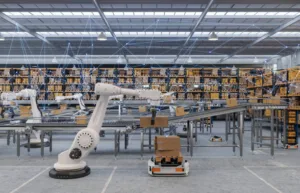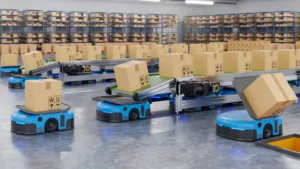Sustainability:

The modern supply chain spans continents, connecting raw materials to finished products in complicated, often opaque networks. While efficiency and cost reduction are driving forces, concerns about environmental effects, ethical sourcing, and social responsibility are gaining momentum. Consumers are increasingly demanding transparency and sustainability, pushing companies to re-evaluate their practices. Fortunately, revolutionary technology such as blockchain is rising as a potent force for change.
Get ready to explore the world of blockchain and supply chains! This revolutionary technology is transforming how products are transported from one place to another while also promoting ethical and sustainable practices. Brace yourself as we take you on a journey through how blockchain is revolutionising the supply chain industry.
Read More: How Bitcoin Technology Makes Micropayments Possible
Exploring Blockchain Technology and Supply Chain Sustainability

Let’s discuss the importance of sustainability and how blockchain technology is contributing to preserving our planet.
1. The Imperative for Sustainable Supply Chains: A Global Perspective
As the world grapples with the challenges of climate change and resource depletion, the need for sustainable practices within supply lines has become imperative. Traditional supply chain systems often struggle to provide the level of transparency needed to trace the origin and effect of products. Enter blockchain, a disruptive force that has the potential to change the way we approach sustainability in the supply chain.
2. Blockchain’s Role in Enhancing Transparency and Traceability
A key driver of supply chain sustainability is openness. Blockchain’s decentralised ledger system ensures that every step of the supply chain is recorded and available to all stakeholders. This transparency empowers consumers and companies alike to trace the journey of goods from their source to the end consumer. By providing an immutable record of transactions, blockchain builds trust and accountability, creating a culture of sustainability.
3. Decentralisation: Reducing Environmental Footprints
The decentralised nature of blockchain removes the need for a central authority, reducing the environmental impact associated with traditional supply chain management. Without a single point of control, blockchain minimises the energy-intensive processes and paperwork found in centralised systems. This shift towards decentralisation aligns with the greater goal of reducing carbon footprints and promoting eco-friendly practices.
4. Smart Contracts: Automating Sustainable Practices
Smart contracts, a hallmark feature of blockchain, allow the automation of processes based on predefined conditions. In the world of supply chain sustainability, this means automating and enforcing eco-friendly practices. Smart contracts can be programmed to trigger actions when specific sustainability standards are met, ensuring that every participant in the supply chain adheres to environmentally responsible practices.
5. Verification of Sustainable Claims: Tackling Greenwashing
Greenwashing, the deceptive practice of exaggerating or falsely claiming environmentally friendly efforts, is a challenge in the sustainability space. Blockchain provides a solution by giving a tamper-proof record of each step in the supply chain. Companies can use blockchain to verify and authenticate sustainability claims, ensuring that the products sold as eco-friendly truly adhere to sustainable standards.
6. Real-Time Monitoring: Proactive Sustainability Management
Traditional supply chain systems often lack real-time visibility, making it challenging to respond quickly to environmental issues. Blockchain’s real-time monitoring features allow for proactive sustainability management. Any deviation from sustainable practices can be quickly identified and addressed, avoiding potential environmental harm before it escalates.
7. Supply Chain Resilience: Mitigating Environmental Risks
Climate change poses risks to supply chain stability, with disruptions becoming more regular and severe. Blockchain improves supply chain resilience by offering a transparent and resilient framework. With an immutable record of transactions, supply chain participants can adapt to unforeseen situations more effectively, ensuring a smoother response to environmental challenges.
8. Collaboration for a Sustainable Future: Blockchain’s Network Effect
Blockchain’s ability to promote collaboration among stakeholders is a game-changer for supply chain sustainability. By bringing together suppliers, manufacturers, distributors, and customers on a common platform, blockchain encourages shared responsibility. This collaborative method amplifies the impact of sustainable practices, creating a network effect that ripples across the entire supply chain ecosystem.
Read More: Discover How Blockchain Features are Changing the Digital Space
Challenges and the Road Ahead

The journey towards a truly sustainable supply chain demands collaboration, creativity, and a commitment to transparent and responsible practices. Blockchain, with its ability to empower stakeholders, promote transparency, and incentivize sustainable behaviour, stands as a powerful tool for driving this change. By harnessing its potential, we can build a supply chain that prioritises environmental responsibility, ethical sources, and social justice, ensuring a more sustainable and equitable future for all.
While the potential of blockchain for sustainable supply chains is immense, challenges remain. Scalability, regulatory uncertainty, and the need for industry-wide collaboration are some of the hurdles that need to be addressed. However, with ongoing development and collaboration, these challenges can be overcome, paving the way for a future where blockchain becomes the backbone of truly sustainable and ethical supply chains.
A Call to Action: Embrace the Green Chain Revolution
The world needs sustainable solutions, and blockchain offers a powerful tool to achieve them. Businesses, consumers, and governments must work together to embrace this technology and unlock its potential for a greener future. By demanding transparency, supporting sustainable practices, and investing in blockchain solutions, we can create a more responsible and sustainable supply chain ecosystem that benefits all.
Read More: Why Blockchain Technology and Decentralized Governance Still Blow Our Minds
Conclusion
Blockchain and supply chain sustainability are a perfect match when it comes to being environmentally friendly. Blockchain technology provides unparalleled transparency and promotes ethical practices in the supply chain industry. With every block and every link, we are moving towards a future where our favourite products are beneficial for both the planet and us. Let’s celebrate the union of technology and ethics, which is turning supply chains into a positive force for good.










